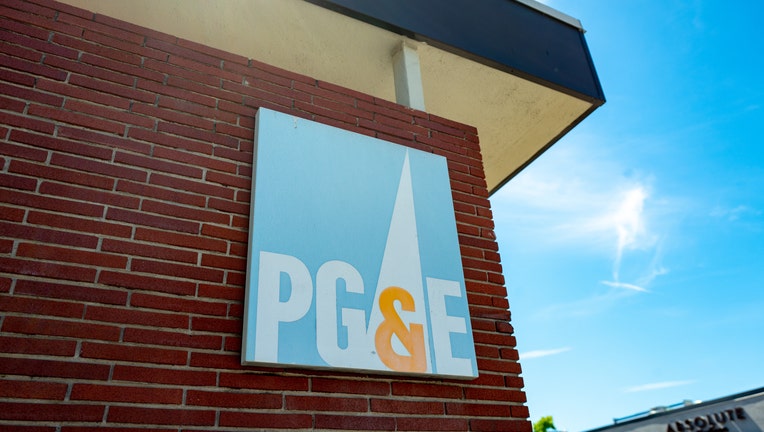PG&E says it has settled one battle involving wildfire fund

Close-up of sign with logo on facade at Pacific Gas and Electric (PGE) customer service station in Walnut Creek, California, June 6, 2019. The company faced bankruptcy concerns in 2019 following alleged wildfire liability. (Photo by Smith Collection/
SAN FRANCISCO (AP) - Pacific Gas & Electric told a federal bankruptcy judge Tuesday that it has settled a dispute with disaster-relief agencies that threatened to siphon money away from a $13.5 billion fund earmarked for victims of catastrophic wildfires in California caused by the nation’s largest utility.
The resolution disclosed by a PG&E lawyer during a court hearing in San Francisco could remove a major stumbling block as the company scrambles to meet a June 30 deadline to emerge from bankruptcy proceedings that began early last year.
It’s still unclear whether the deal worked out between the Federal Emergency Management Agency, California’s Office of Emergency Services and lawyers for wildfire victims will satisfy everyone involved. PG&E attorney Stephen Karotkin said some final details were still being worked out with the help of a federal mediator.
The two disaster relief agencies had been attempting to recover as much as $4 billion from the fund as reimbursement for financial assistance provided during and after fires that raged in Northern California in 2015, 2017 and 2018.
Karotkin doesn’t expect the full settlement to be revealed until next week, but he told U.S. Bankruptcy Judge Dennis Montali that the disaster-relief agencies’ claims will be pared to $1 billion and that amount won’t be paid unless there is money left after the victims’ claims are paid. Lawyers for FEMA and the Office of Emergency Services told the judge they are pleased with the deal worked out with PG&E.
Without repayment, the agencies asserted, U.S. and California state taxpayers could be forced to absorb the costs for cleaning up the mess that might not have happened had PG&E properly maintained power lines that provide electricity to 16 million people.
PG&E faced more than $50 billion in claimed losses from the fires, prompting the utility to file for bankruptcy for the second time in less than two decades.
The San Francisco company has settled the claims of wildfire victims, insurers and a few other government agencies for a total of $25.5 billion as part of its plan to get out of bankruptcy.
Those deals include the $13.5 billion fund earmarked for victims, many of whom have protested the prospect of the disaster-relief agencies taking nearly one-third of the money that is supposed to help people rebuild their lives after losing family members and homes.
Even if the disaster-relief agencies are no longer angling for a piece of the victims fund, significant questions remain for PG&E if it hopes to wrap up one of the most complex bankruptcy cases in U.S. history within the next few months. PG&E must resolve the case by June 30 in order to qualify for coverage from a wildfire insurance fund that California created to help insulate the company against future losses if its outdated electrical grid ignites more fires.
One of the biggest issues is whether the $13.5 billion fund involved in the bankruptcy case would fully compensate victims for emotional damages and property, even with the government agencies now at the back of the line seeking a much lower amount.
Karotkin told Montali that PG&E believes the roughly 82,000 people who are expected to seek money from the victims’ fund would be paid in full, although he wouldn’t guarantee it. About 77,000 people who have filed claims so far have yet to state a specific amount, according to the victims’ lawyers.
Before PG&E struck the deal setting up the $13.5 billion fund in December, the victims’ lawyers had estimated there were about $36 billion in claims.
Montali is now trying to decide whether the victims should be told in a disclosure statement that they might only receive a portion of what they are owed. PG&E is scheduled to send out the statement next month to more than 400,000 parties who will be able to vote on its reorganization plan. Many of the wildfire victims have threatened to vote against the plan in an attempt to pressure PG&E to increase the pool of money, something the company said it can’t afford to do.
PG&E also still must win over California Gov. Gavin Newsom and its chief regulator, the California’s Public Utilities Commission, to get out of bankruptcy. California holds veto power because PG&E needs its approval of its bankruptcy plan to be covered by the state’s wildfire insurance fund.
Newsom and state regulators so far have rejected the plan as carrying too much debt for PG&E to be able to make an estimated $40 billion in improvements to its electrical grid. They also are demanding PG&E replace its entire 14-member board of directors.

